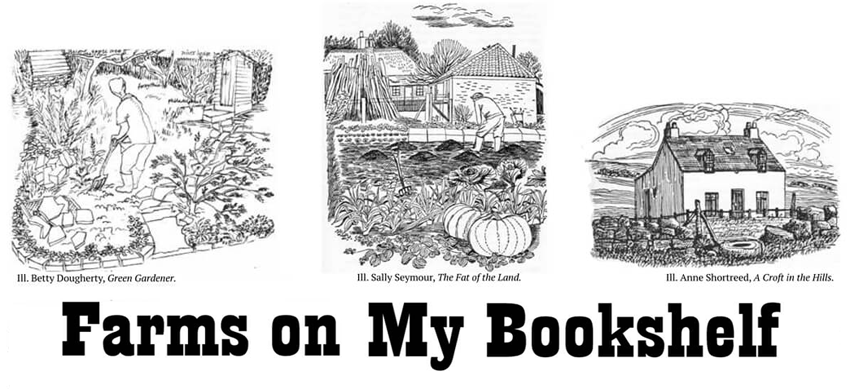At the beginning of the Second World War schoolteachers Anne (the author), Ruth and Mat are evacuated to Oxfordshire. They start looking for a place to spend their holidays. Friends Kath and Iolo who live in Wales find them a house (in 1940) that has been standing empty for a long time, and that will need a lot of repairs.
The house is called Blaen-y-cwm. On this blog you can see its location on a detailed map. Peter Procter's memories of staying there with his aunt Anne can be found on the same blog.
When the friends first go to see the house they find that there are five gates to open and close to get to it.
Because the map is very hard to read I have marked gates, house and other buildings in pink.
The book mainly covers all the hard work it takes to repair the house and to transport all the materials they need. Early on Anne decides to make the furniture herself. This involves reading books, buying tools and wood and a lot of trial and error. She becomes really good at it, and later teaches woodwork in school.
Getting all their stuff to Wales is hard: first there is the train journey (as no more petrol for their car can be had), then everything is loaded on a cart, a bike or a motor cycle, all of which come with their own problems.

The women hardly seem to spend any time just relaxing, which was what they got the house for, I thought. 'The midges were particularly vicious around the stream. They seemed to find the paraffin we had dabbed on our faces pleasant to the taste. On the third day, as we struggled among roots in the dusk, bitten on eyelids, face and ears, Mat suddenly straightened herself, and leaning on het spade said, in the quiet, savage tones of one maddened beyond endurance; 'Has it ever struck you that we come here for a holiday? We spend the whole of daylight digging and delving (this was for the water supply); we work longer than we should ever consider it possible at home, we work every day, we work like navvies, and when we go upstairs to bed, we are so exhausted we are already asleep.'".
Mostly they do seem to thoroughly enjoy all the hard work. Their friend Kath sometimes helps them. She suffers from 'printitis': 'she will painstakingly peel a tattered, yellow, twelvemonth's-old newspaper wrapping from packed furniture legs in order to read last year's news.' I was glad to read about a fellow 'sufferer'!
During the summers life is made extra difficult as the farmer lets a bull live in the fields around their farm, and they sometimes find themselves stuck in the house (with the bull lying on the doorstep) or running for their lives in the fields.
The war hardly gets a mention. Transport is difficult and some materials are hard to come by, but that's it.
After the war they are again able to travel to Wales by car. Once again they spend a summer there. The book ends with Anne describing the process of packing up the house before leaving: rugs, cushions, mattresses have to be hung up or safely packed away, or they will be eaten by mice: 'only a trifle less destructive than termites'.
'To end with departure seems to be the right kind of epilogue, for sometime at Blaen-y-cwm there will be a final Departure, and no future Arrival to anticipate. (...) When that day comes, and the door of Blaen-y-cwm closes, perhaps for another twenty years, perhaps for ever, although it will be a part of my life renounced, the going will be softened by the knowledge that I shall never really leave that valley, and that the years spent among those rocks and mountains, cwms, lakes and woods are too deeply impressed in my memory ever to be forgotten. They are there for all time.'













